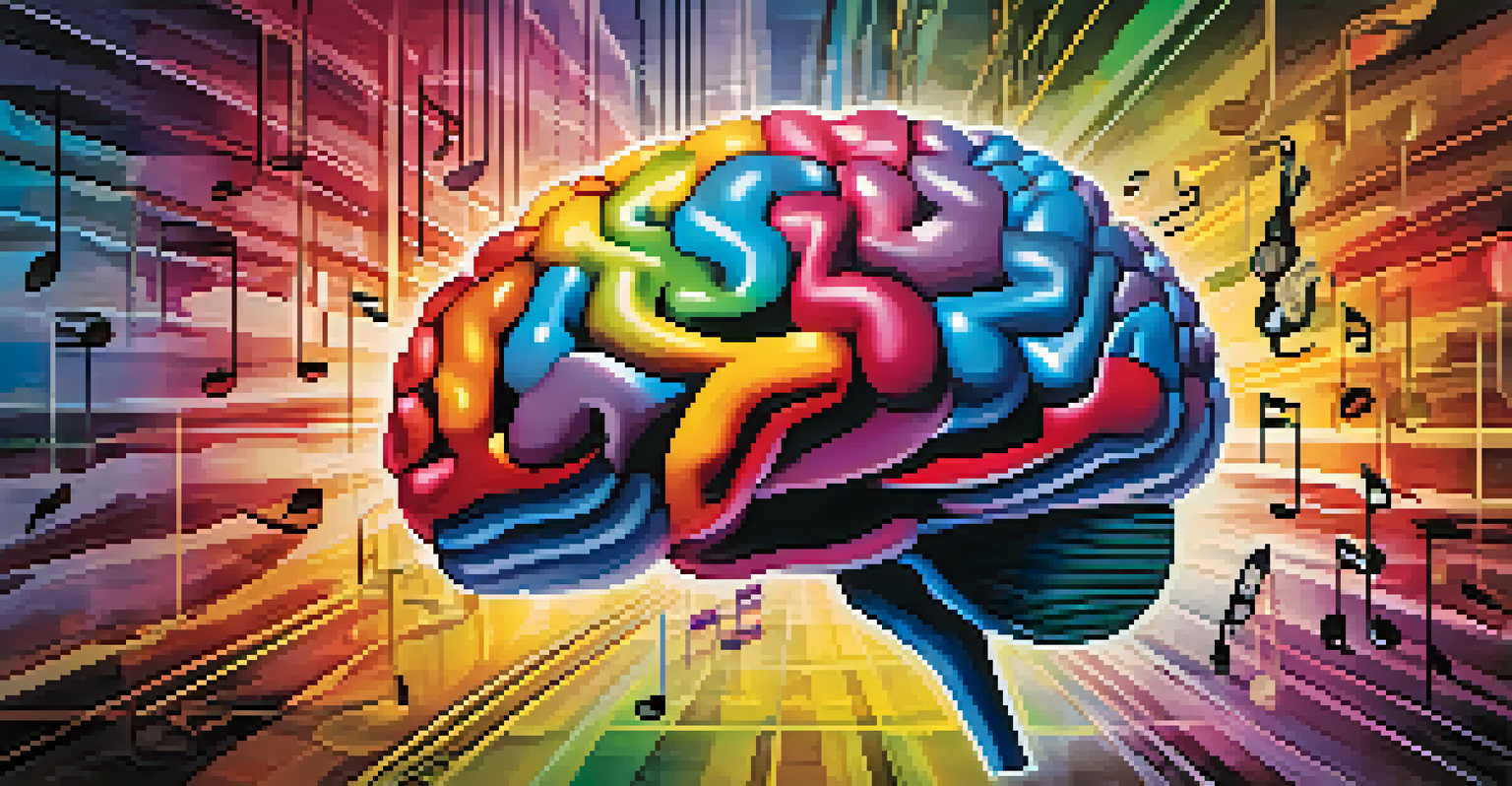The Emotional Psychology of Music Preferences Explained

How Music Connects to Our Emotions
Music has a unique ability to evoke emotions, often bringing us back to specific memories. Whether it’s a song from your childhood or the tune that played at your wedding, these auditory experiences can trigger powerful feelings. This connection is partly due to how our brains process music, associating melodies with emotional states like joy or sadness.
Music can change the world because it can change people.
When we listen to a particular genre, we often seek to amplify or alter our mood. For instance, upbeat pop may boost our spirits, while a melancholic ballad might resonate with our feelings of sadness. This emotional resonance is why we often turn to music during times of stress or joy, as it provides a comforting outlet for our feelings.
Moreover, the emotional response to music can vary significantly from person to person. Factors such as personality, culture, and life experiences shape how we interpret melodies and lyrics. This means that two people might hear the same song but walk away with completely different emotional takeaways.
The Role of Personality in Music Choices
Our music preferences can reveal a lot about our personalities. Research shows that personality traits, such as openness or extraversion, often correlate with specific music genres. For example, individuals who score high on openness are more likely to enjoy complex and diverse musical styles, such as jazz or classical.

Conversely, those who are more agreeable may gravitate towards harmonious and melodic tunes, like soft rock or pop. This connection highlights how our inner selves influence our taste in music, serving as a reflection of who we are at our core. It’s fascinating to think that the songs we love can actually mirror our personalities.
Music Evokes Powerful Emotions
Music has a unique ability to trigger emotions and memories, connecting us to our past experiences.
Understanding the relationship between personality and music can also enhance our social interactions. By recognizing what types of music our friends enjoy, we can gain insights into their personalities, fostering deeper connections. The next time you share your favorite playlist, consider it a window into your soul.
The Impact of Culture on Musical Taste
Culture plays a significant role in shaping our musical preferences. From folk songs passed down through generations to contemporary pop hits, the music we grow up with often reflects our cultural background. This cultural influence can create a strong emotional bond to specific genres, making them feel like home.
Where words fail, music speaks.
For instance, a person raised in a family that celebrates traditional music may find joy and comfort in those sounds, while someone exposed to diverse genres might develop a more eclectic taste. These cultural experiences also contribute to how we perceive and enjoy music, affecting our emotional responses.
Additionally, globalization has led to a fascinating blend of musical styles, allowing us to explore and appreciate sounds from different cultures. This exposure can enrich our emotional landscape, as we learn to connect with music that initially feels foreign. As we embrace these diverse influences, our musical preferences continue to evolve, reflecting the dynamic nature of culture.
Music as a Tool for Emotional Regulation
Many people use music as a way to regulate their emotions, consciously or unconsciously. When we feel overwhelmed or anxious, putting on a favorite song can provide a sense of relief or comfort. This practice highlights music's therapeutic potential, helping us navigate life's ups and downs.
Research suggests that listening to music can lower stress levels and improve mood. For example, calming music can help soothe feelings of anxiety, while upbeat tunes might energize us during a workout. This ability to influence our emotional state makes music a powerful tool in our daily lives.
Personality Shapes Music Preferences
Our music choices often reflect our personalities, revealing insights into who we are.
Furthermore, creating music, whether through playing an instrument or singing, can be an even more effective way of expressing and regulating emotions. Engaging in these activities allows us to channel our feelings constructively, fostering a sense of empowerment and emotional release. So next time you're feeling down, consider turning to music as a source of healing.
The Nostalgic Power of Music
Nostalgia is a powerful emotion that music can evoke, often transporting us back to specific moments in our lives. A song from our teenage years can trigger vivid memories, bringing back feelings of joy, heartbreak, or adventure. This nostalgic connection highlights music's unique ability to act as a time capsule for our emotions.
Researchers have found that nostalgia can lead to increased feelings of happiness and social connectedness. When we reminisce about the past through music, we often feel a sense of belonging, as these songs remind us of shared experiences with friends and family. It's like revisiting a cherished chapter of our lives.
Additionally, nostalgia can also serve as a coping mechanism during difficult times. Listening to songs that remind us of happier moments can provide comfort and solace, helping us navigate challenging emotions. So the next time you hear a familiar tune, embrace the nostalgia and let it remind you of the beautiful moments in your life.
The Influence of Lyrics on Emotional Connection
Lyrics play a crucial role in how we connect with music on an emotional level. Thoughtful, relatable lyrics can resonate deeply, reflecting our experiences, struggles, and desires. When we hear a song that captures our feelings perfectly, it creates a sense of validation and understanding.
For example, a breakup song might evoke feelings of sadness and nostalgia, allowing us to process our own emotions through the artist's words. This shared experience can make us feel less alone, as if someone else understands what we’re going through. The emotional weight of lyrics can be just as powerful as the melody itself.
Culture Influences Musical Taste
Cultural background plays a significant role in shaping our musical preferences and emotional connections to music.
Moreover, the way we interpret lyrics can vary widely based on our personal experiences. A line that resonates with one person might not have the same impact on another. This subjectivity adds a layer of complexity to our emotional connection with music, making it a deeply personal experience.
The Science Behind Music and Emotion
The relationship between music and emotion is not just anecdotal; it’s backed by science. Studies have shown that listening to music activates various brain regions associated with emotions, memory, and even reward. This neurological response explains why music can elicit such strong feelings.
For instance, the release of dopamine, a neurotransmitter linked to pleasure, occurs when we listen to our favorite songs. This biological reaction reinforces our love for certain genres and artists, as it creates a feel-good experience. It's fascinating to think that our enjoyment of music is rooted in our biology.

Additionally, researchers are exploring how different musical elements, such as tempo and harmony, can influence our emotional responses. Fast-paced music might energize us, while slower melodies can create a sense of calm. Understanding these nuances can deepen our appreciation for music and its powerful impact on our emotions.